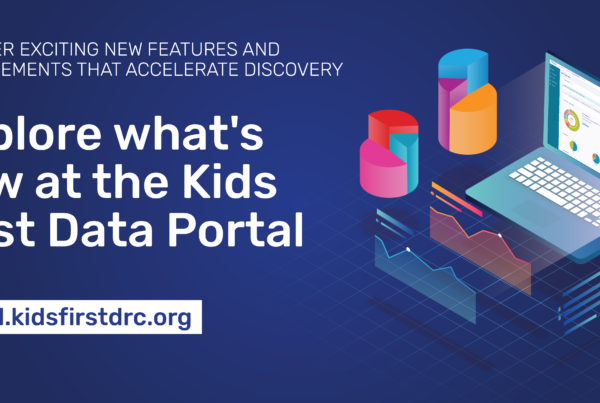Updates to the Gabriella Miller Kids First Data Resource Center – January 2020
The beginning of each new year invites time for measuring growth and milestones, for individuals as well as organizations and collaborating teams. The NIH Common Fund-supported Gabriella Miller Kids First Data Resource Center (Kids First DRC) has been pleased to observe significant growth and change in 2019.
Over the past year, the efforts of investigators, bioinformaticians, data engineers, and administrators at the Kids First DRC have driven incredible expansion of data accessible through the Kids First Data Resource Portal, doubling from seven datasets containing approximately 30,000 files of clinical and genomic data to 14 datasets with over 72,000 files – or more than 1.3 Petabytes – of Whole Genome and Whole Exome Sequences (WGS/WXS), RNA Sequences, miRNA-Seq, Linked-Read WGS, and a variety of clinical data types. 6,659 unique users hailing from 97 different countries visited the Kids First DRC’s website at kidsfirstdrc.org to learn more about the program and how to access data. These visitors generated 26,388 pageviews over 11,944 sessions. The Kids First Data Resource Portal saw 926 unique users across 42 countries, with 861 users (or 61.5%) browsing the Portal for the first time. Registered users grew from just over 200 at the launch of the Portal in September 2018 to more that 1,300 currently registered. Investigators used the portal 5,821 times and accessed over 231 TB of clinical and multi-omic data to power research into childhood cancers and structural birth defects.
Since our last reporting period, the Kids First DRC continued this growth trend, adding new tools, data, and collaborating investigators.
Kids First Investigator Listening tour
Announced earlier in the fall by the NIH Common Fund’s Gabriella Miller Kids First Pediatric Research Program, a new set of research projects have been selected! Ten projects have been announced, encompassing studies at eight medical institutions across the U.S. These studies will generate invaluable data for a number of childhood cancer and structural birth defects including Pediatric Rhabdomyosarcoma, T-cell Acute Lymphoblastic Leukemia, Genomic Etiologies of CHARGE Syndrome, Recessive Structural Brain Defects, and more. To view the complete list of Kids First X01 projects for 2019 and all previous years, visit https://commonfund.nih.gov/kidsfirst/X01Projects.
Since October 2019, the Kids First DRC has conducted a Listening Tour, meeting with each of the Principal Investigators heading these studies. In each hour-long information session, investigators and Data Resource Portal engineers and bioinformaticians had the opportunity to interface, allowing DRC team members to gain more intimate knowledge about the research needs of each X01 study team and introducing investigators to portal features, cloud-based workspace, analysis capabilities, and workflows.
New Data
Since our last reporting period, the Kids First Data Resource Portal has reached a significant milestone, surpassing over One Petabyte of clinical and multi-omic data searchable and accessible to the research community. Dr. Wendy Chung of Columbia University has led the Kids First study on congenital diaphragmatic hernia since 2015. Since October, the Kids First DRC has released data from Dr. Chung’s 2016 and 2017 X01 study cohorts, growing the dataset to over 90TB of clinical and genomic data files from 2,242 study participants and 773 patient families. Data include parent-child trio, duo, and child-only Whole Genome Sequences (WGS), including Aligned Reads, and Variant Calls.
Since the fall, the Kids First Data Resource Portal team has also released a new dataset, for the 2016 Kids First study on the Genetic Basis of Neuroblastoma Initiation and Progression, led by Dr. John Maris of the Children’s Hospital of Philadelphia. More than 358 TB of data from 1,612 study participants and 584 patient families comprise this dataset. Data include trio, duo, and proband-only with matched tumors, Whole Genome Sequences (WGS), Whole Exome Sequences (WXS), RNA-Seq, and Linked-Read WGS, Aligned and Unaligned Reads, Variant Calls, and gVCFs.
These datasets are designated for General Research Use which means they can be used in a variety of ways to answer important scientific questions.
New Features
Released at the start of the new year, the Kids First DRC’s Data Tracker tool is one of two new features to launch in service of enhancing the user experience of Kids First research collaborators. The Kids First DRC data engineering team has developed this new tool to assist Kids First researchers in managing and tracking the status of clinical and genomic data processing; providing a centralized and version-controlled location for sharing progress updates.
The Data Resource Portal team is also excited to roll out a new Members Section for registered Portal users to connect and learn more about the investigators, research supporters, patient advocates, and patient families who make up the Kids First DRC community. With this new feature, registered users of the Portal can opt to make their User Profile public, allowing other users to discover them and learn more about their work, research interests, and/or personal connections to the research efforts underway. Users can input a personal or professional biography; their research interests; contact information including professional affiliations, web pages, and social media profiles; and other relevant information.
With this new feature, investigators seeking to network with peers studying in the same fields of research, or patient families interested in getting involved in the research efforts of investigators can easily connect. The new Members portal also allows users to search peers by name, institution, researcher interest, email address, and more.
The Kids First DRC encourages current and new users of the Data Resource Portal to log on, access their user profile and opt into our public Members list today!
Other improvements to the Data Resource Portal include expanded clinical search criteria in our Explore Data virtual cohort builder tool, new accessibility to select controlled-access data for those users with NIH login credentials, and minor bug fixes.
Inviting New Collaborations
The Kids First DRC is continuously working to forge new collaborations and assist investigators around the world and across the childhood cancer and structural birth defect research landscape in maximizing the discovery potential of their scientific efforts. Whether partnering with other research efforts or working with researchers to optimize the user experience, Kids First DRC experts and administrators are committed to supporting efforts to develop better treatments and scientific insights for the benefit of children everywhere.
To get involved in these efforts, contact the Kids First DRC team at support@kidsfirstdrc.org. You can also visit https://kidsfirstdrc.org/support/getting-started/ to follow our Quick-Start guide to creating your free Data Resource Portal account today!










